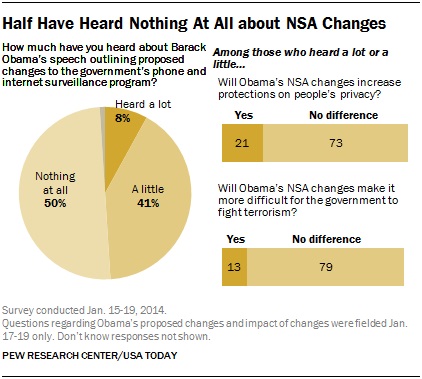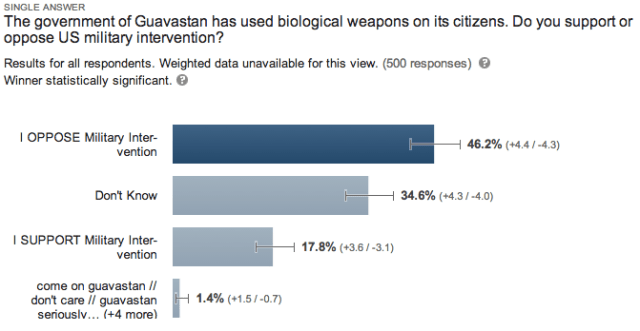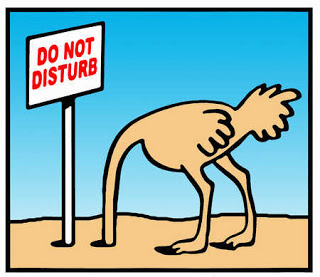Let’s face it: a disturbingly large portion of the American electorate are not-so-knowledgable about their world. As of 2008, 30% still maintain that Saddam Hussein was stockpiling weapons of mass destruction and 18% think the sun revolves around the earth. So, when our friends in the press ran headlines about how most Americans had heard “nothing at all” about President Obama’s recent surveillance reforms, I would have been surprised by exactly the opposite.
Let’s take a trip down the rabbit hole of America’s civic knowledge and whether it matters to a functioning democratic state.
Most Americans Haven’t Heard Of [Insert Issue Here]
Pew surveys released fresh stats about the number of Americans who approve of the National Security Agency’s dragnet program, along with a pie chart showing that 50% had heard “nothing at all” about President Obama’s proposed reforms.

To political pollsters, results like this would be a regular Tuesday. Indeed, it was almost embarrassingly easy to find the exact same results for any given issue.
–Fewer than 25% of Californians knew “much at all” about the massive healthcare overhaul, the Affordable Care Act, that impacts every single American.
—Fewer than half of parents with children in public schools knew anything about the Common Core Standards, arguably one of the most radical overhauls of education in at least 50 years.
—A measly 39% of Republicans who think the 2012 attacks on an embassy in Benghazi was the “biggest political scandal in American history” could identify that event took place in a country called Libya.
–For kicks, 41% of Americans cannot ID their folksy deputy commander-in-chief, Vice President Joe Biden
Polls Get More Disturbing/Hilarious
In truth, polls may be radically overestimating Americans’ knowledge. Respondents are known to offer strong feelings for policies that do not actually exist. To test the extremes of this fact in the most disturbing/hilarious possible fashion, I conducted a national poll to see how Americans thought about military intervention in an imaginary country. This was around the time when the president was debating forceful humanitarian intervention in Syria.
A whopping 63% of Americans polled had an opinion, either for or against, helping out the good people of “Guavastan”. Guavastan, not yet an actual place, is a luxury island I hope to inhabit after striking it rich in the field of journalism.

Some folks got our little joke. One respondent quipped, “guavastan…is that near papaya ville”. Others just had a knee-jerk reaction, “who can prove if they used biological weapons some news sources say pictures are a hoax?” The results were dispiriting to say the least.
Here’s the point: mathematically speaking, Americans are bigger fans of believing things than knowing things.
Does It Matter?
It’s nice rhetorical fodder to call for greater American civil involvement, but it’s not entirely clear that an informed America is a different America. In 1998, two Political Scientists, Arthur Lupia and Mathew McCubbins found the beliefs of politically ignorant Americans correlate nicely with their more informed counterparts. Indeed, this is exactly how a representative democracy is supposed to function.
They write:
Experimental evidence seems to (partly) corroborate this finding. One of my favorite Political Scientists, Alan Gerber, randomly assigned a group of citizens to receive a free subscription to the Washington Post. In the depressingly titled paper “Does The Media Matter”, his team found no effect of either paper on political knowledge, stated opinions, or turnout in post-election survey and voter data.”
Gerber and others [PDF] have found that informed people tend to shift their favor towards the Democratic Party, which may lead to increased to support for laws focusing on lower socioeconomic status individuals.
To be sure, other democracies around the world are more engaged and civil, but it’s largely because they either have a multi-party system or a robust informal civil society. No country on earth is an informed Utopia–or anything close.
That said, I’m more optimistic that information does matter. So, TechCrunch is also conducting its own experiment, partnering with Reframe.it and the Knight Foundation on a so-called “deliberative poll.” Deliberative polls are a snapshot of what Americans would think about an issue if they were educated. A random, representative sample of the population is intensively educated about an issue and then we record how opinions shift.
In previous deliberative polls conducted by Stanford, there have been some shifts in opinion which suggest that yes, information does matter.
When it comes to tech issues, TechCrunch will find out, hopefully soon.
